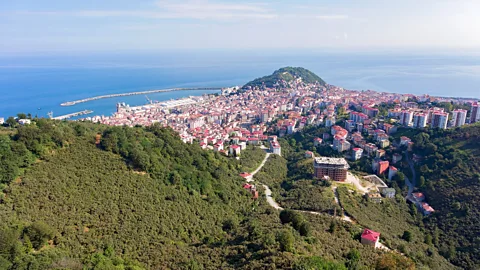 Getty Images
Getty ImagesFans of a flavoured coffee or sweet treat may not know that most of the world’s hazelnuts come from one seaside mountain range in Turkey, where women have been producing them for centuries.
Located on the slopes of the Pontic mountain range overlooking the Black Sea in north-eastern Turkey, the ancient city of Giresun is known for its stunning coastal views and dramatic jagged mountains. But more than anything, it’s known for its hazelnuts.
More than 72% of the world’s hazelnuts come from Turkey, and about 60% come from the Eastern Black Sea region where Giresun is located. The tradition of hazelnut farming goes back thousands of years here. Ancient Greece’s so-called “father of history”, Herodotus, even waxed about Turkey’s hazelnut bounty in the 5th Century BC. Since the 1400s, hazelnuts from Giresun and the surrounding eastern Black Sea region have been imported to Europe and beyond.
The BBC programme Discovering the World’s Table explored Turkey to learn more about the source of this sweet nut.
Before a batch of hazelnuts make their way, for example, into a jar of Nutella, they’re farmed in places like Turkey. In Giresun, hazelnuts have historically been grown by women, and today women are also beginning to take over the production and sale of hazelnut goods as well, such as an array of chocolate products. In the past, the nuts were often exported overseas, only to be sold back to Turkey in the form of things like chocolate bars and spreads. However, businesses like Home of the Hazelnut, run by three sisters whose family has deep roots in the local hazelnut industry, are starting to change that.
“In this region, 80% of the hazelnut products are processed by women,” Sayari Sungur, one of the company’s owners and co-founders, tells Discovering the World’s Table host Nick Kwek. “It is always women who are best at taking care of these nuts, both in the fields and in the gardens. So now we want those women to become both the growers and the decision-makers.”

Meet the Host
Nick Kwek is a TV presenter, director, producer, technology and food journalist and a frequent host of the BBC Travel Show.
Since launching nine years ago, Home of the Hazelnut has been maintaining Giresun’s ancient tradition while also becoming something of an example for a new generation of local women. Sungur takes pride in her family’s success and in how it has inspired other women in the area to start their own enterprises. “Now that lots of women have started to see how valuable this product is, many more are starting to produce it and own it. I think this is phenomenal,” she told the BBC.
Though Turkey’s hazelnut industry is still booming, there is trouble on the horizon. As in many places around the world, the country’s ability to grow hazelnut trees and shrubs is under threat from environmental factors. A changing climate is affecting the crop here, leading to more humidity and an influx of pests – both of which can stunt and kill hazelnut plants.
“[As the climate has changed], new pests are arriving in the last three or four years,” explained Dr Sebahat K Ozman-Sullivan, a plant protection scientist and hazelnut farmer who grew up in the Giresun region. “It’s a big problem to control because it’s feeding on many plants. Also, if we have the high humidity we are having the mildew disease,” she added, explaining that hazelnuts typically thrive in drier climates.
Ozman-Sullivan worries that local attempts to curtail the pest infestation may be doing more harm than good: “People use pesticides [but]… it’s not good because there are many microorganisms living in the soil and we have to keep them alive.”
Hazelnut farmers in Giresun are fiercely proud of the bounty that comes from their unique mountain-meets-sea ecosystem. And many, like Ozman-Sullivan, are determined to protect it and their traditions for future generations.
“We want to [continue to] grow hazelnuts in this beautiful landscape,” she said.
For more, watch the video above, or tune into Discovering the World’s Table for a full episode on Turkey’s sweet bounty.

